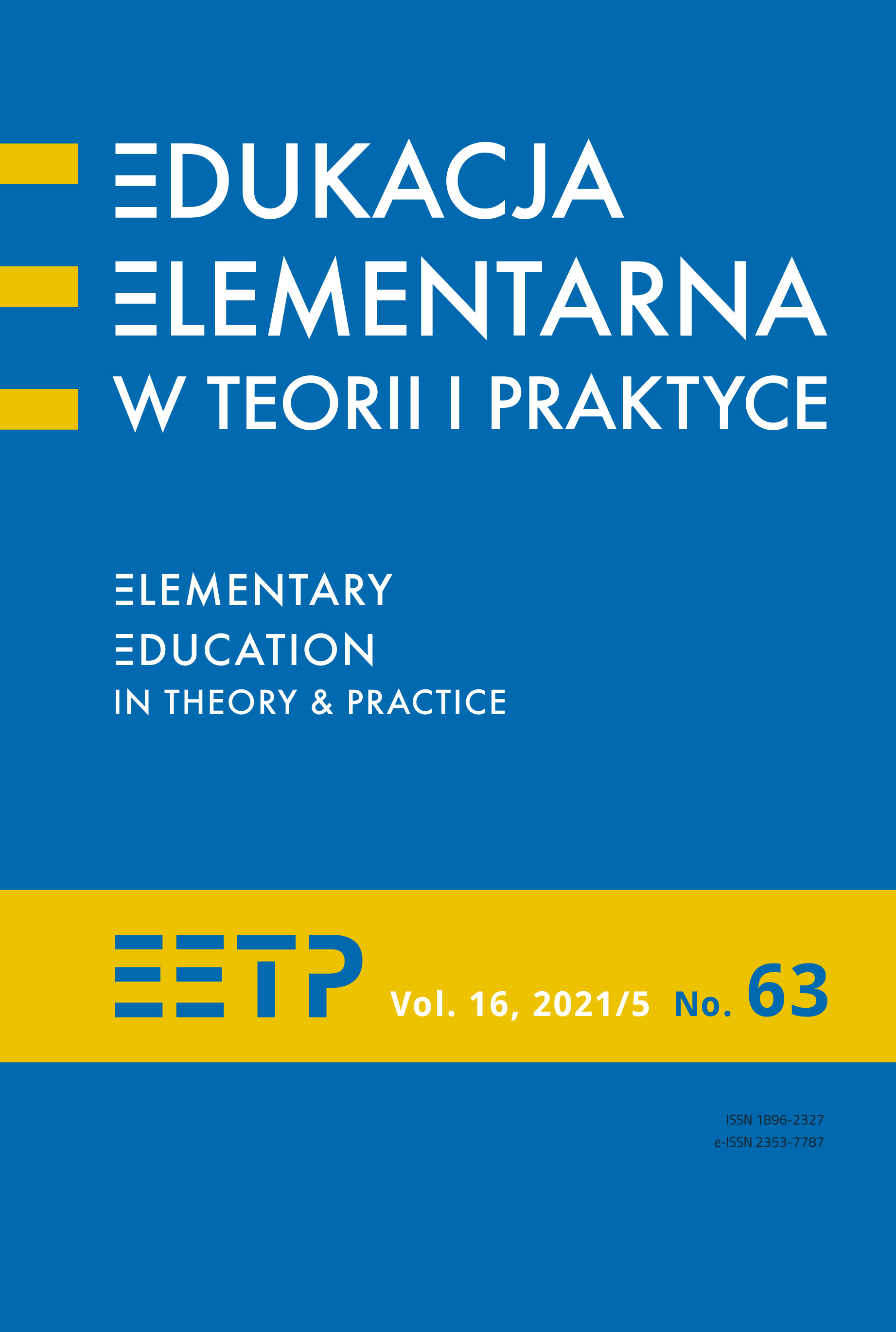Mental Well-being of a Child in the Process of School Education in Times of the Pandemic
Abstract
The aim of the study is to reflect on the mental well-being of a child functioning in the process of school education in times of the pandemic. The article presents theoretical considerations on the concept of mental well-being, and a synthetic analysis of the functioning of the school education system, especially during the Covid-19 pandemic. The aim of the author's research is to verify the sense of mental well-being of children in the process of their participation in remote school education, and the research problem is the question: to what extent does a child participating in remote school education feel satisfied with the process of their own education, their own activity, and the existing state of affairs? During the analysis of the collected research material, the author attempts to answer the question by showing various contexts of the student's functioning in the process of online learning.
References
Chałas K. (2020). Przestrzenie aktywności nauczyciela akademickiego i studenta w świetle dydaktyki zaangażowanej, „Studia Pedagogica Ignatiana”, nr 2, 111-127.
Cieślińska J. (2013). Poczucie dobrostanu i optymizmu życiowego kadry kierowniczej placówek oświatowych, „Studia Edukacyjne”, nr 27, 95–112.
Foucault M. (1998). Nadzorować i karać. Narodziny więzienia. Warszawa: Wydawnictwo Fundacji Aletheia.
Gawlicz K. (2008). Konstruowanie nieudacznika. Praktyki normalizacji i wykluczania w przedszkolu, „Zeszyty Etnologii Wrocławskiej”, nr 1(10), 37–54.
Ilska M., Kołodziej – Zaleska A. (2018). Dobrostan hedonistyczny i eudajmonistyczny w sytuacjach kryzysów normatywnych i nienormatywnych, „Zeszyty Naukowe Politechniki Śląskiej”, Seria: Organizacja i Zarządzanie, nr 123, 155–184.
King L. A. , Eells J. E. , Burton C. M. (2007). Pojęcie dobrego życia – w ujęciu szerokim i wąskim. [w:] P. A. Linley, S. Joseph (red.), Psychologia pozytywna w praktyce. Warszawa: PWN, s. 19 – 41.
Klus-Stańska D. (2010). Dydaktyka wobec chaosu pojęć i zdarzeń. Warszawa: Wydawnictwo Akademickie Żak.
Klus – Stańska D. , Nowicka M. (2019). Sensy i bezsensy edukacji wczesnoszkolnej. Gdańsk: Harmonia.
Klus – Stańska D. (red.). (2015). (Anty)edukacja wczesnoszkolna, Kraków: Impuls.
Kossakowska K. , Zadworna M. (2019). Wybrane aspekty dobrostanu psychicznego uczniów na różnych etapach edukacji. Doniesienia wstępne, „Studia Edukacyjne” nr 54, 221–235.
Marti E. P. Seligman (1993). Optymizmu można się nauczyć. Poznań: Media Rodzina.
Plebańska M. ,Sieńczewska M., Szyller A. (2020) Raport – Edukacja zdalna w czasach COVID – 19. Warszawa: Wydział Pedagogiczny Uniwersytetu Warszawskiego .
Przyszczypkowski K. (2012). Polityczność (w) edukacji, Poznań: Wydawnictwo Naukowe UAM.
Surma B. (2019). Wprowadzenie, „Edukacja Elementarna w Teorii i Praktyce” nr 4 (54), t. 14, Edukacja STEM – rozwijanie myślenia naukowego w przedszkolu,7-8.
Seligman M. E. P.(2002). Authentic Happiness: Using the New Positive Psychology to Realize Your Potencjal for Lasting Fulfillment. New York: Free Press, Simon and Schuster.
Seligman, M. E. P. (2011). Pełnia życia. Nowe spojrzenie na kwestię szczęścia i dobrego życia. Poznań: Media Rodzina
Śliwerski B. (2015). Edukacja (w)polityce. Polityka (w)edukacji, Kraków: Oficyna Wydawnicza Impuls.
Śliwerski B. (2007). Pedagogika dziecka. Studium pajdocentryzmu. Gdańsk: Pedagogika GWP.
Śliwerski B. (2009). Problemy współczesnej edukacji. Dekonstrukcja polityki oświatowej III RP. Warszawa: Wydawnictwo Akademickie i Profesjonalne.
Śliwerski B., Śliwerska W. (1991). Edukacja w wolności. Kraków: Oficyna Wydawnicza Impuls.
Copyright (c) 2021 Elementary Education in Theory and Practice

This work is licensed under a Creative Commons Attribution-NoDerivatives 4.0 International License.
- When submitting a text, the author declares that he/she is the Author of the article (hereinafter referred to as the “Work”) and:
- he/she owns the exclusive and unlimited copyright to the Work,
- is entitled to dispose of the copyright to the Work.
Declares that it does not infringe any third party copyrights or legal rights.
Declares that there is no conflict of interest.
2. At the same time, the Author grants the Ignatianum University in Cracowa royalty-free, non-exclusive and territorially unlimited licence to use the Work in the following fields of exploitation:
- recording the Work in a hard copy, as well as on a digital or magnetic medium;
- reproduction of the Work using any technique, without limitation of the number of editions or copies;
- distribution of the Work and its copies on any medium, including marketing, sale, lending, and rental;
- introduction of the Work into a computer memory;
- disseminating the Work in information networks, including in the Internet;
- public performance, exhibition, display, reproduction, broadcasting and re-broadcasting, as well as making the Work available to the public in such a way that everyone can have access to it at a time and place of their own choosing;
- within the scope of dependent rights to the Work, including in particular the right to make necessary changes to the Work resulting from editorial and methodical development, as well as to translate the Work into foreign languages;
The licence is granted from the moment of the transfer of the Work to the Ignatianum University in Cracow. The Ignatianum University in Cracow is entitled to grant further sub-licences to the Work within the scope of the right granted. The licence is time-limited and it is granted for a period of 15 years, starting from the date of its granting.
Authors are permitted and encouraged to publish their text online (e.g. in their institution’s repository or on the institution’s website) before or during the submission process as this may lead to beneficial exchanges, as well as earlier and greater citation of the published text (See The Effect of Open Access). We recommend using any of the following portals of research associations:
- ResearchGate
- SSRN
- Academia.edu
- Selected Works
- Academic Search




